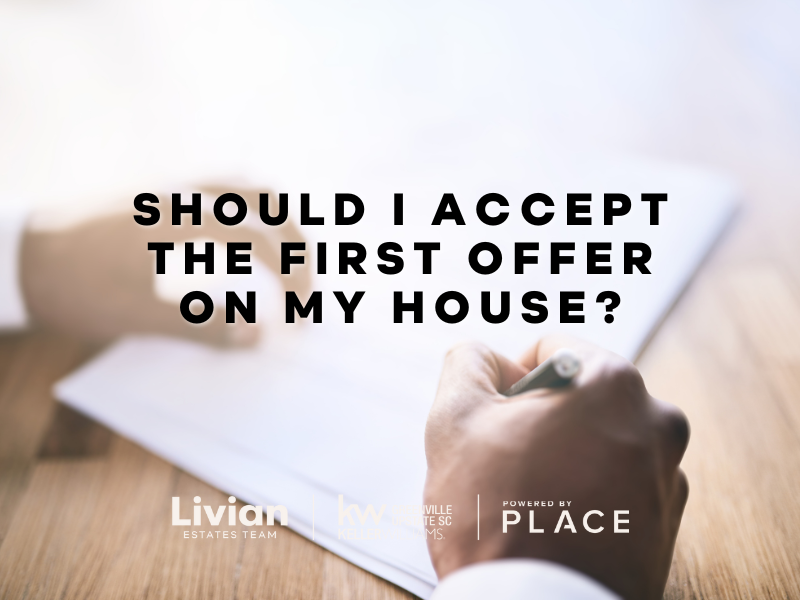Categories
Home SellingPublished October 17, 2025
Should I Accept the First Offer on My House? | A Simple, No-Fluff Guide for Upstate Sellers

Quick truth: getting an offer right away feels awesome. It can also make you rush into a decision you’ll regret. Let’s walk through what that first offer really means, what to check, and when saying “thanks, but no thanks” might be the smarter move.
1) First offer = good news, not an obligation
An early offer proves there’s buyer interest. That’s valuable. But it’s not a guarantee you got the best deal. Sometimes buyers offer quickly because they want to lock something down; sometimes they lowball to start a negotiation. Treat it like a conversation starter, not the finish line.
2) Look beyond the headline price
When you read an offer, check:
-
Is it cash or financed? Cash is faster and cleaner; financed offers are common but come with lender conditions.
-
Contingencies: inspection, appraisal, buyer sale-of-home contingency — these affect your risk and timeline.
-
Closing date and possession: do they match your needs?
-
Earnest money: higher earnest money usually shows commitment.
A high offer with lots of contingencies can be worse than a slightly lower, clean offer.
3) Local market context matters (short version)
Right now in the Greenville area, prices have been steady-to-up slightly and inventory is a bit higher than the hottest days, which means buyers have a bit more choice and homes are spending longer on market than during the pandemic rush. Median sale prices in the region are roughly in the high $300Ks to low $400Ks depending on the source and exact neighborhood, and average days on market are commonly in the 40–70 day range. That makes pricing and presentation important.
4) When to strongly consider accepting the first offer
Say yes fast if most of these are true:
-
The offer is at or above your target price (after fees and taxes).
-
It’s cash or pre-approved with strong financing proof.
-
Contingencies are minimal (or reasonable).
-
Closing date and buyer needs match yours.
-
You don’t want the hassle or risk of waiting for something better.
If all that lines up, the speed can be a real advantage.
5) When to push back or keep marketing
Hold off if:
-
The price is well under comparable recent sales.
-
Buyer has weak or no financing proof.
-
There are lots of contingencies that could let them walk away.
-
You suspect the buyer is trying to lowball because your home just hit the market.
-
You want to test the market for a few more days (often 5–14 days is enough to see more interest).
6) Quick negotiation moves that work
-
Counter, don’t panic: counter for price or tighten contingencies.
-
Ask for earnest money increase if you’re worried they’ll back out.
-
Keep one thing simple: if you accept a slightly lower price, try to get a cleaner contract (fewer contingencies) or a quicker close.
-
Split repairs: agree to fix only safety/structural items and ask for credit for cosmetic things.
7) Pricing strategy matters more than rolling dice on the first offer
A smart asking price that reflects comps and current market conditions gets you better offers — sometimes multiple offers. If you list too high, you’ll scare buyers off; too low and you might leave money on the table. Work with your agent for a realistic price range for your specific neighborhood.
8) Practical checklist — what to review BEFORE signing
-
Buyer’s proof of funds / preapproval letter
-
Offer price vs. your net proceeds estimate
-
Inspection and appraisal contingencies
-
Closing timeline and possession terms
-
Any requested seller concessions (closing costs, repairs)
-
Title and HOA specifics (if applicable)
FAQs (short, useful answers)
Q: If the first offer is below asking, should I automatically counter?
A: Usually yes — counter with a price closer to comps and keep contingencies the same. You’ll often get a better outcome than flatly rejecting.
Q: How long should I keep my home on market before deciding?
A: In our local market, 1–3 weeks often shows whether demand is real. But if the first offer meets your goals, you don’t have to wait.
Q: Will accepting the first offer make buyers believe my place is undesirable?
A: Not necessarily. If the offer is fair, buyers and agents understand sellers take good offers. If you accept an obviously low offer, other buyers may assume you were desperate.
Q: Can I accept an offer and still keep showing the house?
A: Usually no, once you accept and both parties sign, it’s a contract. If you want to keep options open, don’t accept; instead counter or request an informal “backup offer” clause.
Seller tips to get better first offers
-
Stage and photograph well — first impressions online drive showings.
-
Price smart, not optimistic — a small price advantage can bring multiple offers.
-
Be flexible on showing times — more showings = more competition.
-
Fix obvious issues (smoke detectors, squeaky doors) — buyers focus on avoidable negatives.
-
Use a strong listing agent who knows your neighborhood comps and negotiation tactics.
(If you want photography or virtual staging help to polish your listing, that can make an immediate difference.)
Accepting the first offer can be smart if it meets your price and contract-cleanliness goals. Don’t rush based on excitement alone. Look at the financing proof, contingencies, timeline, and local market context. If you’re unsure, counter or ask your agent for a competitive response, it often gets you a better deal without losing the buyer.
Need a hand?
If you want someone local to run the numbers for your address, prep your listing, or handle negotiations, the Livian Estates Team can provide a no-pressure market analysis, pro photos, and negotiation support to help you decide whether to take the first offer or test the market. Contact us today!





